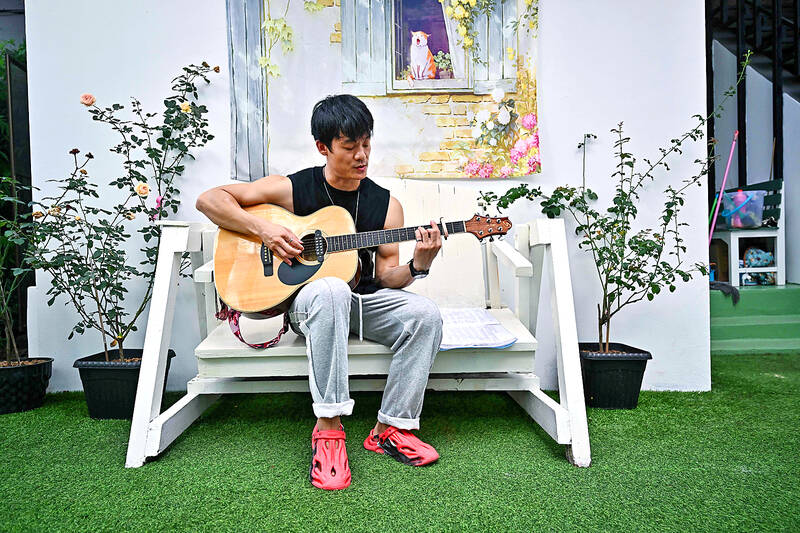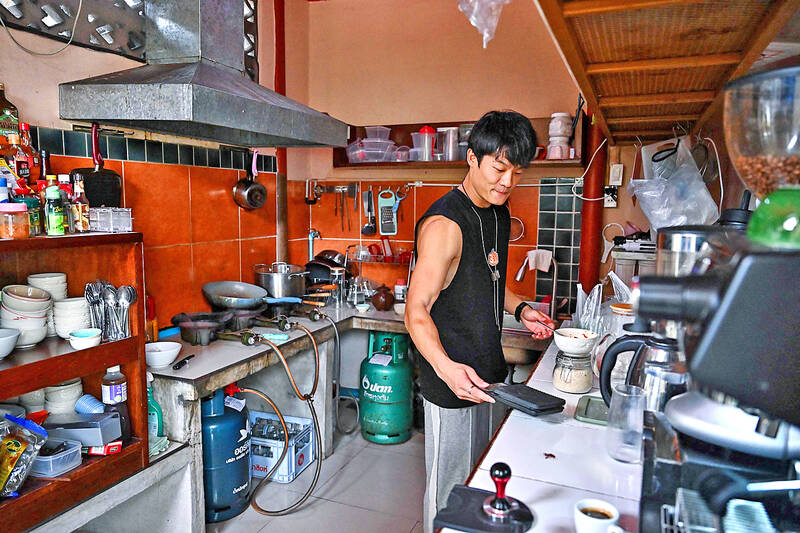Hitting tennis balls across a tree-lined court in Thailand’s mountainous north, Connie Chen’s weekly private training session is a luxury the Chinese national could barely afford when she lived in Shanghai.
China implemented some of the world’s toughest COVID restrictions during the pandemic, putting hundreds of millions of people under prolonged lockdowns. In the aftermath, younger citizens — exhausted by grueling and unrewarding jobs — are taking flight to escape abroad.
With a relatively easy process for one-year study visas, a slower pace of living and cheap living costs, Thailand’s second-largest city Chiang Mai has become a popular destination.

Photo: AFP
“During the pandemic, the desire for freedom became stronger,” said Chen, a 26-year-old former bank worker.
In China’s financial capital Shanghai — hit by some of the strictest pandemic lockdowns — Chen had a stable, well-paid job, but was unhappy with the career path that lay ahead of her.
After the pandemic, Chen knew something had to change.

Photo: AFP
“Even if I kept doing this job for the rest of my life, it would just be like this,” she said.
“But life is so short that I want to try something different.”
Chen is emblematic of many of her generation: unlike their parents who benefited from China’s then-booming economy, younger Chinese are burdened by a weak economy.

Photo: AFP
Prospects for promotion are few and competition is ferocious, leading many to burn out. Chen researched foreign language programs, choosing Thailand where she and her husband, Gordon Lin, moved in May under a one-year education visa.
And now they are determined to live abroad long-term.
“I feel there are a lot of opportunities outside and I feel hope,” she said.
The COVID lockdowns in Shanghai led to rare street protests that quickly escalated into demonstrations across other major cities in China, prompting a crackdown by the nation’s communist rulers.
The people interviewed for this story were reluctant to discuss politics, but all insisted their moves abroad were motivated by wanting a different lifestyle.
DECENT, DIGNIFIED LIFE
The surging desire to leave China can be seen in patterns on WeChat, the Chinese messaging app.
Searches for “emigration” have spiked, hitting 510 million in one day in October, according to Chinese-language media, while in late January “immigrating Thailand” was searched more than 300,000 times in a single day.
Thailand is seen as easier than Europe or North America, with the kingdom offering several types of long-term visas, including a one-year language course — costing roughly US$700 to US$1,800.
“I think there’s a sudden increase of desire for leaving China,” said social anthropologist Xiang Biao, from Germany’s Max Planck Institute for Social Anthropology.
Thailand has come to be regarded by many Chinese as a stepping stone country, he said, ideal to experiment with living abroad.
But compared to migration in the 1990s and 2000s, when many kept connections with China for business, Xiang said there was a new trend of people wanting to totally uproot themselves.
He added while this group were educated they were not necessarily part of the elite or wealthy.
“They are cosmopolitan, open-minded and they cherish a basic sense of freedom — not necessarily political freedom, but they want to live a life that they feel is decent and is dignified,” he said.
And unlike previous generations, they are not seeking to make their fortune abroad.
“It is really thinking of the question of what kind of life they want, what kind of adults they want to become,” he said.
‘JUST DO IT FIRST’
Back at the tennis court in Chiang Mai, Chen’s husband Lin cheers her on.
The former e-commerce employee had planned to work hard, save and then retire early. But he felt increasingly suffocated by the identikit mindset surrounding him.
“It’s all about going to a good university, finding a good job, being a civil servant,” the 32-year-old said.
Chen and Lin have only been in Thailand for a few months, living off savings while they consider their next move.
But for Yin Wenhui it is time to go.
The 31-year-old arrived during the pandemic, stranded after China shut its borders, but after a few months he didn’t want to return to face relentless pressure from family and peers to devote himself utterly to work.
“I feel more free here. The pace was too fast in China, I didn’t have the freedom to do things I wanted to,” he said.
Now instead of obsessing about work he runs a Chiang Mai hostel with friends, goes to the gym daily and has learned to cook. Fulfilling a childhood dream, he was also learning to play the guitar — something his parents frowned upon.“Here I have more time to think, think about what kind of life I want,” he said.
But now the honeymoon is over for him — he has grown frustrated by the slow pace of life and is ready for the next stage.
“I want to go to a developed country, as it will be better than China or Chiang Mai on culture, work and also salary,” he said.

Last month historian Stephen Wertheim of the Carnegie Endowment for International Peace published an opinion piece in the New York Times with suggestions for an “America First” foreign policy for Democratic presidential candidate Kamala Harris. Of course China and Taiwan received a mention. “Under presidents Trump and Biden,” Wertheim contends, “the world’s top two powers have descended into open rivalry, with tensions over Taiwan coming to the fore.” After complaining that Washington is militarizing the Taiwan issue, he argues that “In truth, Beijing has long proved willing to tolerate the island’s self-rule so long as Taiwan does not declare independence

Big changes are afoot in global politics, which that are having a big impact on the global order, look set to continue and have the potential to completely reshape it. In my previous column we examined the three macro megatrends impacting the entire planet: Technology, demographics and climate. Below are international trends that are social, political, geopolitical and economic. While there will be some impact on Taiwan from all four, it is likely the first two will be minor, but the second two will likely change the course of Taiwan’s history. The re-election of Donald Trump as president of the US

Nov. 25 to Dec. 1 The Dutch had a choice: join the indigenous Siraya of Sinkan Village (in today’s Tainan) on a headhunting mission or risk losing them as believers. Missionaries George Candidus and Robert Junius relayed their request to the Dutch governor, emphasizing that if they aided the Sinkan, the news would spread and more local inhabitants would be willing to embrace Christianity. Led by Nicolaes Couckebacker, chief factor of the trading post in Formosa, the party set out in December 1630 south toward the Makatao village of Tampsui (by today’s Gaoping River in Pingtung County), whose warriors had taken the

Gunshots, screams, eerie laughter: South Korea’s border island Ganghwa is being bombarded nightly with blood-curdling sounds, part of a new campaign by the nuclear-armed North that is driving residents to despair. Before it started, 56-year-old Kim Yun-suk fell asleep to the hum of insects and woke to the chirping of birds. Now, she is kept awake every night by what sounds like the soundtrack of a low-budget horror movie at top volume. “The peaceful sounds of nature... have now been drowned out,” Kim said. “All we hear is this noise.” The campaign is the latest manifestation of steadily declining ties between the two Koreas